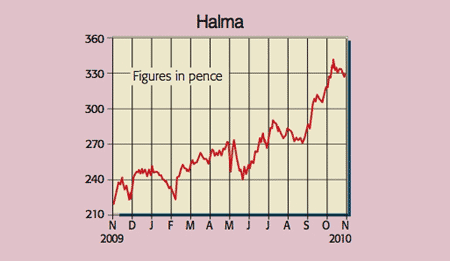
Halma is a rare stock. With the exception of Tesco and PZ Cussons, it is the only company in the FTSE 250 that has lifted its dividend by 5% per year or more since 1980. This is a terrific achievement. However, what the board can’t control is the share price. Up until 18 months ago, the City viewed Halma as a classic widows-and-orphans stock: defensive, but dull. Since then the shares have been on fire, surging a blood-pumping 130% to all-time highs. Why?
Well, it’s largely thanks to some secure, if not sparkling, returns. With today’s near-zero interest rates, fixed-income investors are being forced to feed lower down the food chain in their search for yields. Bonds and gilts are simply too expensive. Hence many investors have piled into stocks such as Halma. But does this make sense?
On the positive side, the firm has a nice story to tell. It designs a broad array of products that enhance public health and safety and minimise injuries in the workplace. For instance, it sells fire alarms, smoke detectors, security systems and automatic door sensors that are typically installed in commercial buildings. It also supplies gas detectors, safety valves and water purifiers for industrial applications. It even makes pieces of kit that spot leaks in underground pipes, along with instruments that are used in opticians’ clinics to test for eye problems.
What’s important here is that these niche markets tend to expand at the rate of GDP, with most now having legal requirement status. That means that the more new health and safety regulations that are introduced, the higher the growth rate. Better still, many of these products have formally to be certified as being ‘fit for purpose’ before they can be sold.
Turkey of the week: Halma (LSE: HLMA), tipped as a BUY by Jefferies
The upshot of all this is that these largely non-discretionary items tend to compete more on functionality and accreditation than on straight price. That in turn protects Halma’s juicy operating profit margins – currently in the 18% to 20% range. The flipside, though, is that sooner or later these lucrative returns will entice new entrants, such as the Chinese, who could eventually turn these cosy niches into cut-throat commodities.
But that’s not my biggest concern. No, the scariest thing is the firm’s valuation. The City is forecasting turnover and underlying EPS of £491m and 19.5p respectively for the year ending March 2011, rising to £520m and 20.9p a year later. As such the stock trades on p/e ratios of 16.9 and 15.8, while only paying a 2.9% yield. I would rate Halma on a ten-times operating profit multiple –assuming sustainable margins of 17.5%. That generates an intrinsic worth of about 230p per share. And if there’s ever a whiff of inflation, then transitory income-seeking investors could unwind their positions quickly and sell up.
Finally, there is always a chance that at some point politicians will become frustrated by the barrage of often questionable health and safety legislation. This is burdening industries with billions of pounds in compliance costs. In fact, David Cameron has already hinted that something may be done when, in early 2010, he attacked the UK’s “over-the-top” health and safety culture. Interims are due on 30 November.
Recommendation: TAKE PROFITS at 330p
• Paul Hill also writes a weekly share-tipping newsletter, Precision Guided Investments